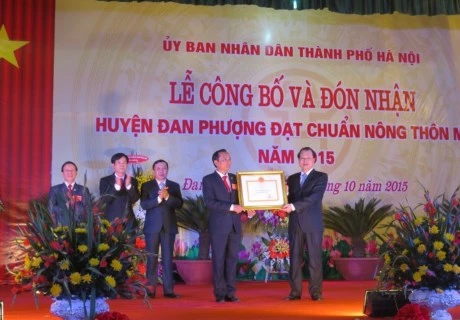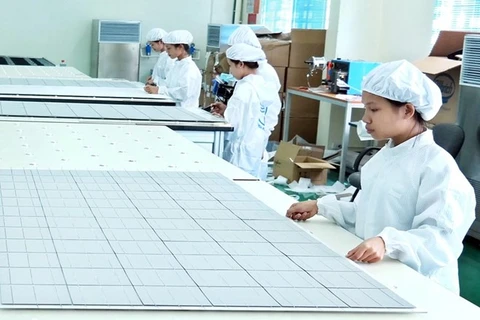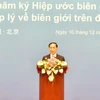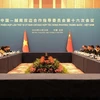The capital of Hanoi will strive for further growth in the next five years and is resolved to keep its image in the hearts of people across the nation, a municipal leader said.
In order to meet this goal, the city has outlined major tasks, focusing on the synchronous development and modernisation of urban and rural infrastructure, said Pham Quang Nghi, Secretary of the Hanoi Party Committee, at an interview with the Vietnam News Agency ahead of the city’s 16 th Party Congress, scheduled for October 31 – November 3.
Hanoi will also speed up administrative reforms, improve the investment environment, spur local production and raise the quality of human resources, the official said.
Hanoians will continue to lead elegant, civilised lives and develop comprehensively in a bid to meet the new period’s requirements, he added.
Reviewing Hanoi’s performance over the past five years, Nghi said the city took an active part in lawmaking to create a legal foundation to deal with challenges, especially those emerging after its administrative border expansion in 2008.
The city’s gross domestic product (GDP) growth was estimated at 9.23 percent, nearly 1.6 times the national average.
Meanwhile, per capita income in 2015 stood at about 3,600 USD, 1.8 times higher than in 2010. State budget collection also exceeded predictions, with more than 714 trillion VND (roughly 32 billion USD) gathered in five years, representing an annual average rise of 7.1 percent.
According to Nghi, the National Assembly’s approval of the Law on the Capital City has created favourable conditions for Hanoi’s specific mechanisms and policies, thus facilitating management and administration that will turn Hanoi into a civilised, modern city.
In the 2011 – 2015 period, the city completed planning for branches and sectors as well as administrative planning in districts, towns and satellite urban areas, moving toward rapid, sustainable development.
However, the official noted, the economic growth had yet to match the city’s potential and strength, due to inadequate mechanisms and policies, as well as limited resources to serve long-term and urgent development.
Inefficient leadership, instruction, management and administration were also to blame, he said.
Following the administrative border expansion in 2008, cultural traditions and heritages of merged localities have become part of the Thang Long-Hanoi culture, helping diversify the more than 1,000-year-old treasure.
The preservation of folk festivals, relic and tourism sites such as the Huong Pagoda Festival and Duong Lam Ancient Village received due attention, Nghi added.
He reaffirmed that the administrative border expansion was necessary to help Hanoi deal with a spectrum of issues caused by population density in areas such as health care, education and employment.
The decision also attracted investment and contributed to infrastructure development, transport connections, and rural development in the city, he said, noting that Hanoi is taking the lead in building new-style rural areas.
Mentioning the “Year of Urban Order and Civilisation” campaign in 2014 and 2015, Nghi said Hanoi has been given a facelift and, more importantly, local citizens’ awareness has improved significantly.
It is municipal leaders’ and people’s responsibility to build a beautiful Hanoi to deserve its titles as the “heroic capital city” and the “city of peace,” he said.
In conclusion, the city leader confirmed that the resolve of the entire municipal Party, army and people will serve as great momentum to turn Hanoi into a more wealthy, civilised, modern capital city.-VNA






















